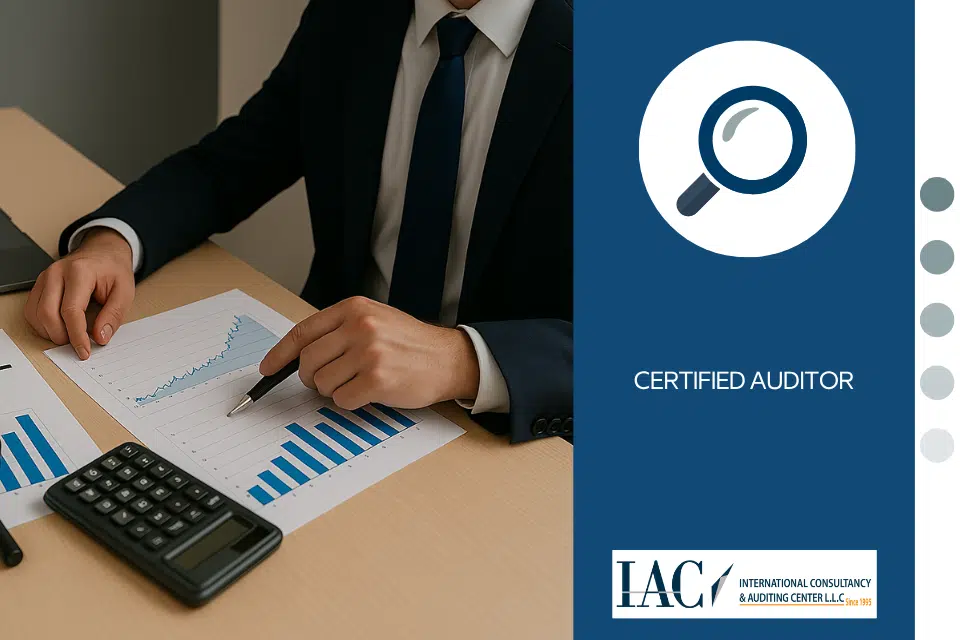Certified Auditor in the UAE: Audit Services and Financial Transparency
In the world of finance and business, there is an urgent need for an independent and trustworthy party to examine and review financial data to ensure its accuracy and compliance with laws. This is where the role of the “auditor” comes in, who acts as an impartial external eye that monitors financial performance, uncovers weaknesses and violations, and helps institutions improve their financial and operational systems. In the UAE, appointing a certified auditor is a necessary step for companies of all sizes, especially with the development of tax legislation and the expansion of economic activities.
Who is the Auditor?
An auditor is a licensed and specialized individual or entity that examines and analyzes a company’s financial records to ensure their accuracy and compliance with international accounting standards (IFRS) and local regulations. The auditor enjoys a high level of independence and professionalism, and their final report is an official document relied upon by authorities such as tax entities, banks, judicial bodies, and investors.
Importance of Auditors in the UAE
-
Legal Compliance: UAE law requires companies to submit financial reports certified by an external auditor.
-
Enhancing Trust: An independent auditor enhances investor and lender confidence in a company’s financial statements.
-
Error and Fraud Detection: Helps detect accounting errors or financial fraud before they escalate.
-
Improving Financial Efficiency: Offers valuable recommendations to improve financial control and management.
-
Reporting to Authorities: Such as the annual audit report required by free zones and the Federal Tax Authority.
Services Provided by the Auditor
-
Annual financial audits
-
Preparation of final financial reports
-
Reviewing tax compliance (Corporate Tax – VAT)
-
Auditing data before submission to banks or investors
-
Providing financial and tax consultations
-
Internal auditing and improving internal control systems
Standards Used by the Auditor
-
International Financial Reporting Standards (IFRS)
-
International Standards on Auditing (ISA)
-
UAE regulations such as Federal Law No. 2 of 2015 on Commercial Companies
-
Federal Tax Authority (FTA) regulations
Steps in the Audit Process
-
Data Collection: Obtaining all accounting records, invoices, and contracts.
-
Analysis and Evaluation: Reviewing financial operations and analyzing balances.
-
Verification: Ensuring transactions are recorded accurately.
-
Reconciliation: Matching data with official documents.
-
Report Preparation: Issuing a detailed report that accurately reflects the financial situation.
Difference Between Accountant and Auditor
Accountant
The accountant is responsible for recording, analyzing, and classifying financial transactions in the accounting records, preparing periodic financial statements such as the balance sheet and income statement, and ensuring compliance with approved accounting standards within the company. Accountants usually work internally and prepare reports to assist management in decision-making.

Auditor
The auditor is an internal or independent expert who examines the financial records prepared by the accountant to ensure their accuracy and credibility, and to verify the company’s compliance with financial laws and standards. The auditor issues a neutral and independent report that evaluates the fairness of the financial statements, often required for legal or investment purposes.
How to Choose a Certified Auditor in the UAE?
-
Must be officially licensed by regulatory bodies
-
Should have a reputable professional record and local market experience
-
Offers comprehensive services including auditing and tax consultancy
-
Works transparently and delivers promptly
Role of the Auditor in Corporate Tax
Since the adoption of Corporate Tax in the UAE, having a certified auditor has become critically important. The auditor reviews financial data, verifies the accuracy of profits and expenses, and provides a report that assists in correctly preparing the tax return, helping the company avoid penalties and legal risks.
Why Choose the International Consultancy & Auditing Center?
-
A specialized team of certified auditors with experience in the UAE market
-
Legally recognized audit reports accepted by all official bodies
-
Comprehensive accounting and tax consultancy services
-
Our services cover all emirates with high accuracy and professionalism
To get in touch and request a free consultation, please call: +971525682655
Conclusion
An auditor is not just a regulatory tool but a strategic partner in the success and financial stability of your company. Choosing a certified and experienced auditor is a smart investment in your company’s future.
Start today by contacting us at: +971 52 568 2655 to get a free consultation from our experts at the International Consultancy & Auditing Center.
Frequently Asked Questions (FAQ)
Yes, most regulatory bodies in the UAE require companies to submit annual audit reports from a certified auditor.
The cost varies depending on the size of the company and the nature of its operations, and increases with the complexity of activities and the volume of financial data to be audited.
Internal auditors work within the company and report to management, while external auditors are independent entities that issue official reports for external stakeholders.
Yes, part of their role is to help with tax compliance and provide advice on how to legally reduce tax burdens. Is an certified auditor legally required for all companies?
How much do audit services cost?
What is the difference between internal and external auditors?
Can certified Auditor provide tax consultations?




